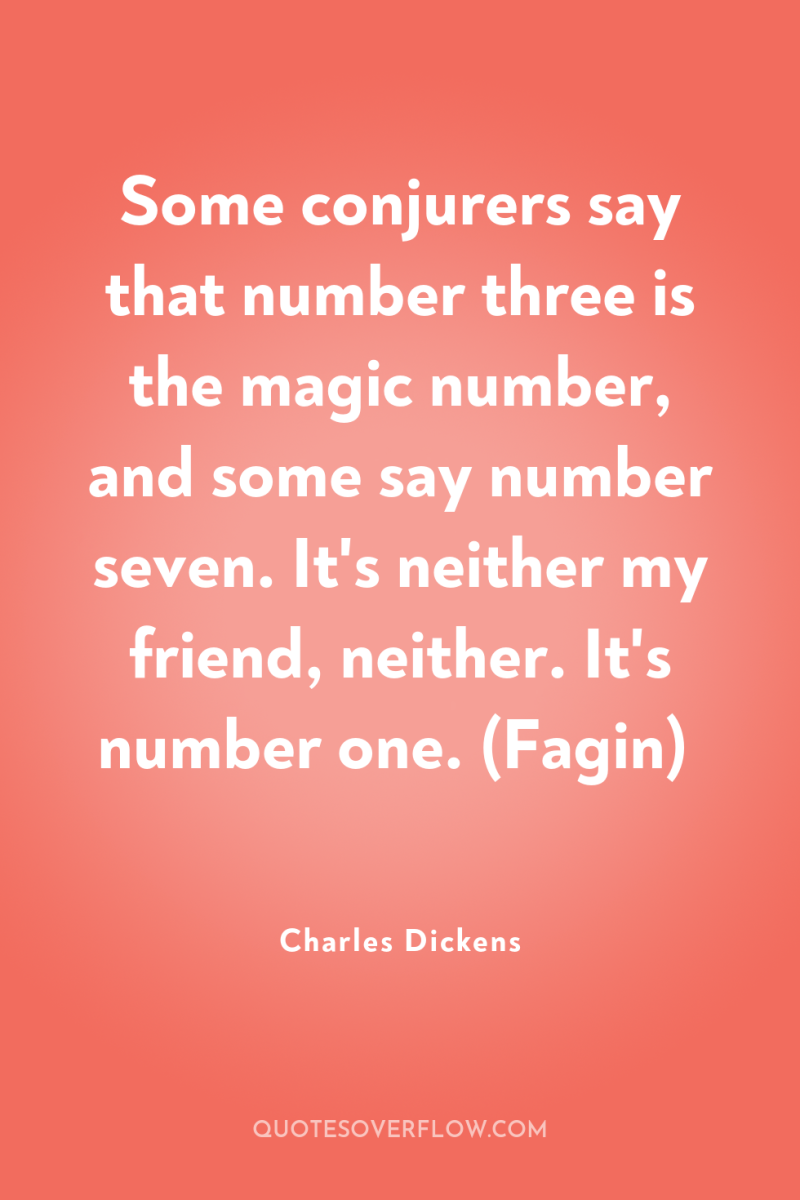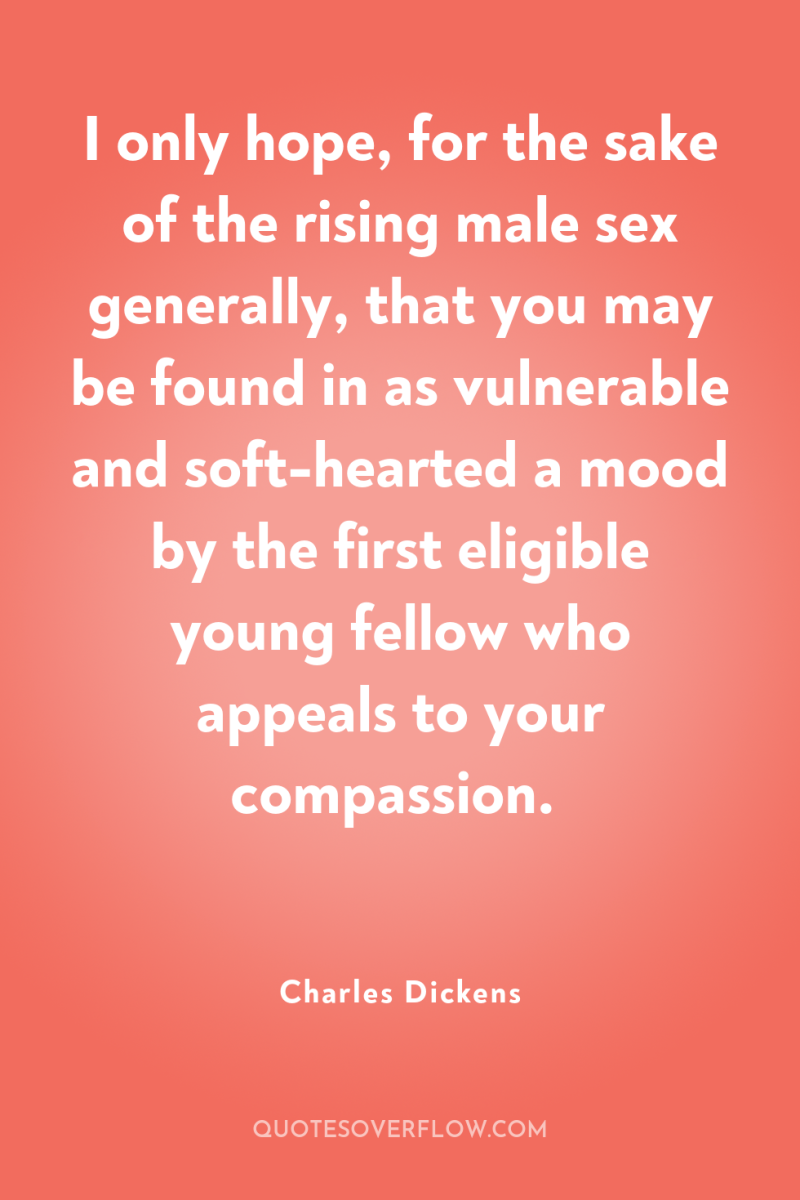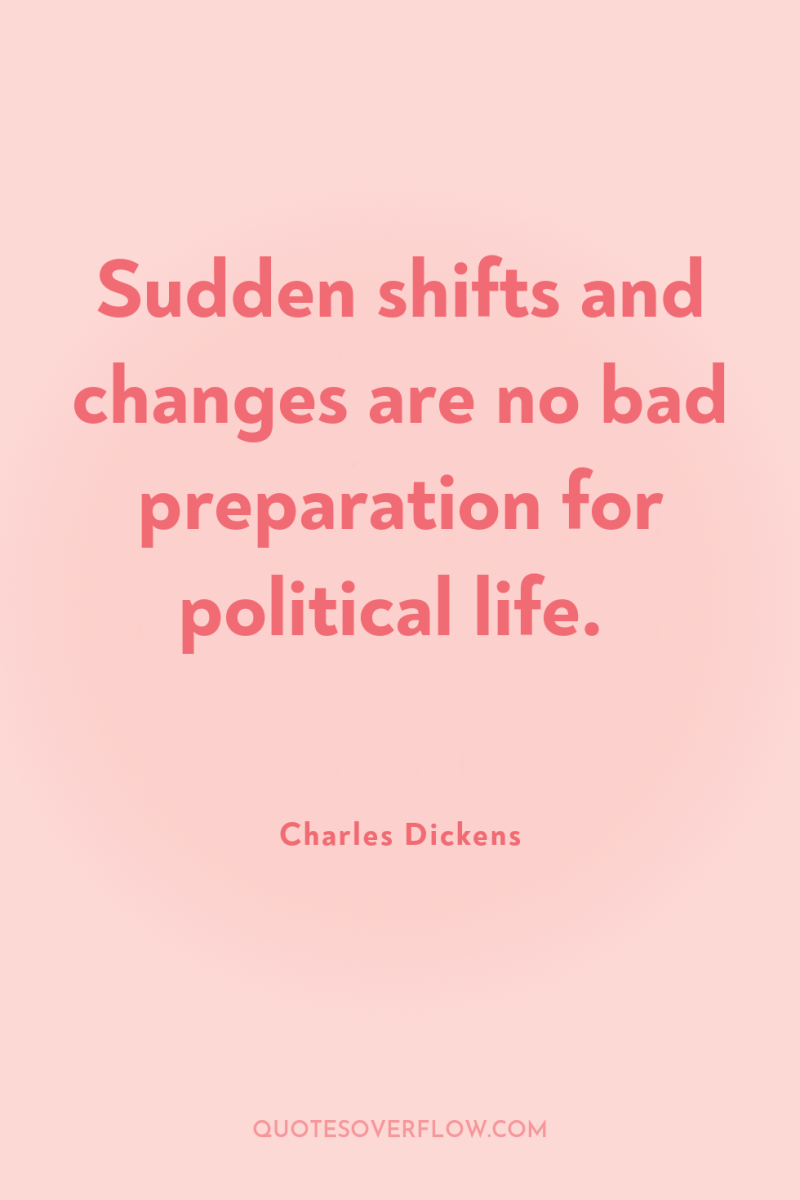
1
Some conjurers say that number three is the magic number, and some say number seven. It's neither my friend, neither. It's number one. (Fagin)Charles Dickens
2
The boy was lying, fast asleep, on a rude bed upon the floor; so pale with anxiety, and sadness, and the closeness of his prison, that he looked like death; not death as it shews in shroud and coffin, but in the guise it wears when life has just departed; when a young and gentle spirit has, but an instant, fled to Heaven: and the gross air of the world has not had time to breathe upon the changing dust it hallowed.Charles Dickens

3
Dignity, and even holiness too, sometimes, are more questions of coat and waistcoat than some people imagine.Charles Dickens

4
There are books of which the backs and covers are by far the best parts.Charles Dickens
5
Your haughty religious people would have held their heads up to see me as I am tonight, and preached of flames and vengeance, ' cried the girl. 'Oh, dear lady, why ar'n't those who claim to be God's own folks as gentle and as kind to us poor wretches as you, who, having youth, and beauty, and all that they have lost, might be a little proud instead of so much humbler?Charles Dickens
6
The doctor seemed especially troubled by the fact of the robbery having been unexpected, and attempted in the night-time; as if it were the established custom of gentlemen in the housebreaking way to transact business at noon, and to make an appointment, by the twopenny post, a day or two previous.Charles Dickens

7
I only hope, for the sake of the rising male sex generally, that you may be found in as vulnerable and soft-hearted a mood by the first eligible young fellow who appeals to your compassion.Charles Dickens
8
I can't go into a long explanation before company; but I couldn't help it, upon my honour." Upon your what?" growled Sikes, with excessive disgust. "Here! Cut me off a piece of that pie, one of you boys, to take the taste of that out of my mouth, or it'll choke me dead.Charles Dickens
9
Why look'e, young gentleman, " said Toby, "when a man keeps himself so very ex-clusive as I have done, and by that means has a snug house over his head with nobody a-prying and smelling about it, it's rather a starling thing to have the honour of a wisit from a young gentleman (however respectable and pleasant a person he may be to play cards with at conweniency) circumstanced as you are.Charles Dickens
10
There are a good many books, are there not, my boy?” said Mr. Brownlow, observing the curiosity with which Oliver surveyed the shelves that reached from the floor to the ceiling.“ A great number, sir, ” replied Oliver; “I never saw so many.”“ You shall read them if you behave well, ” said the old gentleman kindly; “and you will like that, better than looking at the outsides, - that is, in some cases, because there are books of which the backs and covers are by far the best parts.Charles Dickens
11
My heart is set, as firmly as ever heart of man was set on woman. I have no thought, no view, no hope, in life beyond her; and if you oppose me in this great stake, you take my peace and happiness in your hands, and cast them to the wind.Charles Dickens
12
I know that she deserves the best and purest love the heart of man can offer, " said Mrs. Maylie; "I know that the devotion and affection of her nature require no ordinary return, but one that shall be deep and lasting.Charles Dickens

13
Bless the bright eyes of your sex! They never see, whether for good or bad, more than one side of any question; and that is always, the one which first presents itself to them.Charles Dickens
14
Such a number of nights, ' said the girl, with a touch of woman's tenderness, which communicated something like sweetness of tone, even to her voice; 'such a number of nights as I've been patient with you, nursing and caring for you, as if you had been a child: and this the first that I've seen you like yourself; you wouldn't have served me as you did just now, if you'd thought of that, would you? Come, come; say you wouldn't.Charles Dickens
15
But struggling with these better feelings was pride, --the vice of the lowest and most debased creatures no less than of the high and self-assured. The miserable companion of thieves and ruffians, the fallen outcast of low haunts, the associate of the scourings of the jails and hulks, living within the shadow of the gallows itself, --even this degraded being felt too proud to betray a feeble gleam of the womanly feeling which she thought a weakness, but which alone conneced her with that humanity, of which her wasting life had obliterated so many, many traces when a very child.Charles Dickens
16
The girl's life had been squandered in the streets, and among the most noisome of the stews and dens of London, but there was something of the woman's original nature left in her still; and when she heard a light step approaching the door opposite to that by which she had entered, and thought of the wide contrast which the small room would in another moment contain, she felt burdened with the sense of her own deep shame: and shrunk as though she could scarcely bear the presence of her with whom she had sought this interview.Charles Dickens
17
Always the way! " muttered the Jew to himself as he turned homewards. "The worst of these women is, that a very little thing serves to call up some long-forgotten feeling; and the best of them is, that it never lasts. Ha! ha!Charles Dickens

18
Sudden shifts and changes are no bad preparation for political life.Charles Dickens
19
Let the tears which fell, and the broken words which were exchanged in the long close embrace between the orphans, be sacred. A father, sister, and mother, were gained, and lost, in that one moment. Joy and grief were mingled in the cup; but there were no bitter tears: for even grief arose so softened, and clothed in such sweet and tender recollections, that it became a solemn pleasure, and lost all character of pain.Charles Dickens
20
Joy and grief were mingled in the cup; but there were no bitter tears: for even grief itself arose so softened, and clothed in such sweet and tender recollections, that it became a solemn pleasure, and lost all character of painCharles Dickens
21
If an enthusiastic, ardent, and ambitous man marry a wife on whose name there is a stain, which, though it originate in no fault of hers, may be visited by cold and sordid people upon her, and upon his children also: and, in exact proportion to his success in the world, be cast in his teeth, and made the subject of sneers against him: he may-no matter how generous and good his nature- one day repent of the connection he formed in early life; and she may have the pain and torture of knowing that he does so.Charles Dickens
22
The mental agony I have suffered, during the last two days, wrings from me the avowal to you of a passion which, as you well know, is not one of yesterday, nor one I have lightly formed. On Rose, sweet, gentle girl! my heart is set, as firmly as ever heart of man was set on woman. I have no thought, no view, no hope in life, beyond her; and if you oppose me in this great stake, you take my peace and happiness in your hands, and cast them to the wind. Mother, think better of this, and of me, and do not disregard the happiness of which you seem to think so little. .Charles Dickens
23
The persons on whom I have bestowed my dearest love lie deep in their graves; but, although the happiness and delight of my life lie buried there too, I have not made a coffin of my heart, and sealed it up for ever on my best affections. Deep affliction has only made them stronger; it ought, I think, for it should refine our nature.Charles Dickens
24
I have seen enough, too, to know that it is not always the youngest and best who are spared to those that love them; but this should give us comfort rather than sorrow, for Heaven is just, and such things teach us impressively that there is a far brighter world than this, and that the passage to it is speedy.Charles Dickens
25
Your tale is of the longest, " observed Monks, moving restlessly in his chair. It is a true tale of grief and trial, and sorrow, young man, " returned Mr. Brownlow, "and such tales usually are; if it were one of unmixed joy and happiness, it would be very brief.Charles Dickens
26
As she stooped over him, her tears fell upon his forehead. The boy stirred, and smiled in his sleep, as though these marks of pity and compassion had awakened some pleasant dream of a love and affection he had never known; as a strain of gentle music, or the rippling of water in a silent place, or the odour of a flower, or even the mention of a familiar word, will sometimes call up sudden dim remembrances of scenes that never were, in this life; which vanish like a breath; and which some brief memory of a happier existence, long gone by, would seem to have awakened, for no voluntary exertion of the mind can ever recall them.Charles Dickens
27
Dickens writes that an event, "began to be forgotten, as most affairs are, when wonder, having no fresh food to support it, dies away of itself.Charles Dickens
28
Such is the influence which the condition of our own thoughts, exercises, even over the appearance of external objects. Men who look on nature, and their fellow-men, and cry that all is dark and gloomy, are in the right; but the sombre colours are reflections from their own jaundiced eyes and hearts. The real hues are delicate, and need a clearer vision.Charles Dickens
29
Gradually, he fell into that deep tranquil sleep which ease from recent suffering alone imparts; that calm and peaceful rest which it is pain to wake from. Who, if this were death, would be roused again to all the struggles and turmoils of life; to all its cares for the present; its anxieties for the future; more than all, its weary recollections of the past!Charles Dickens
30
The great principle of out-of-door relief is, to give the paupers exactly what they don't want; and then they get tired of coming.Charles Dickens
31
It is because I think so much of warm and sensitive hearts, that I would spare them from being wounded.Charles Dickens
32
For the rest of his life, Oliver Twist remembers a single word of blessing spoken to him by another child because this word stood out so strikingly from the consistent discouragement around him.Charles Dickens
33
It is the custom on the stage: in all good, murderous melodramas: to present the tragic and the comic scenes, in as regular alternation, as the layers of red and white in a side of streaky, well-cured bacon. The hero sinks upon his straw bed, weighed down by fetters and misfortunes; and, in the next scene, his faithful but unconscious squire regales the audience with a comic song. We behold, with throbbing bosoms, the heroine in the grasp of a proud and ruthless baron: her virtue and her life alike in danger; drawing forth a dagger to preserve the one at the cost of the other; and, just as our expectations are wrought up to the highest pitch, a whistle is heard: and we are straightway transported to the great hall of the castle: where a grey-headed seneschal sings a funny chorus with a funnier body of vassals, who are free of all sorts of places from church vaults to palaces, and roam about in company, carolling perpetually. Such changes appear absurd; but they are not so unnatural as they would seem at first sight. The transitions in real life from well-spread boards to death-beds, and from mourning weeds to holiday garments, are not a whit less startling; only, there, we are busy actors, instead of passive lookers-on; which makes a vast difference. The actors in the mimic life of the theatre, are blind to violent transitions and abrupt impulses of passion or feeling, which, presented before the eyes of mere spectators, are at once condemned as outrageous and preposterous.Charles Dickens
34
He spoke in hard and angry earnest, if a man ever did, " replied the girl, shaking her head. "He is an earnest man when his hatred is up. I know many who do worse things; but I'd rather listen to them all a dozen times, than to that Monks once.Charles Dickens
35
Oliver has long since grown stout and healthy; but health or sickness made no difference in his warm feelings to those about him, though they do in the feelings of a great many people. He was still the same gentle, attached, affectionate creature that he had been when pain and suffering had wasted his strength; and when he was dependent for every slight attention and comfort on those who tended him.Charles Dickens
36
To do a great right, you may do a little wrong; and you may take any means which the end to be attained will justify.Charles Dickens
37
Spring flew swiftly by, and summer came; and if the village had been beautiful at first, it was now in the full glow and luxuriance of its richness. The great trees, which had looked shrunken and bare in the earlier months, had now burst into strong life and health; and stretching forth their green arms over the thirsty ground, converted open and naked spots into choice nooks, where was a deep and pleasant shade from which to look upon the wide prospect, steeped in sunshine, which lay stretched out beyond. The earth had donned her mantle of brightest green; and shed her richest perfumes abroad. It was the prime and vigour of the year; all things were glad and flourishing. .Charles Dickens
38
Dickens writes that one of his characters, "listened to everything without seeming to, which showed he understood his business.Charles Dickens
39
Oh! if, when we oppress and grind our fellow-creatures, we bestowed but one thought on the dark evidences of human error, which, like dense and heavy clouds, are rising, slowly it is true, but not less surely, to Heaven, to pour their after-vengeance on our heads; if we heard but one instant, in imagination, the deep testimony of the dead men's voices, which no power can stifle, and no pride shut out; where would be the injury and injustice: the suffering, misery, cruelty, and wrong: that each day's life brings with it! .Charles Dickens